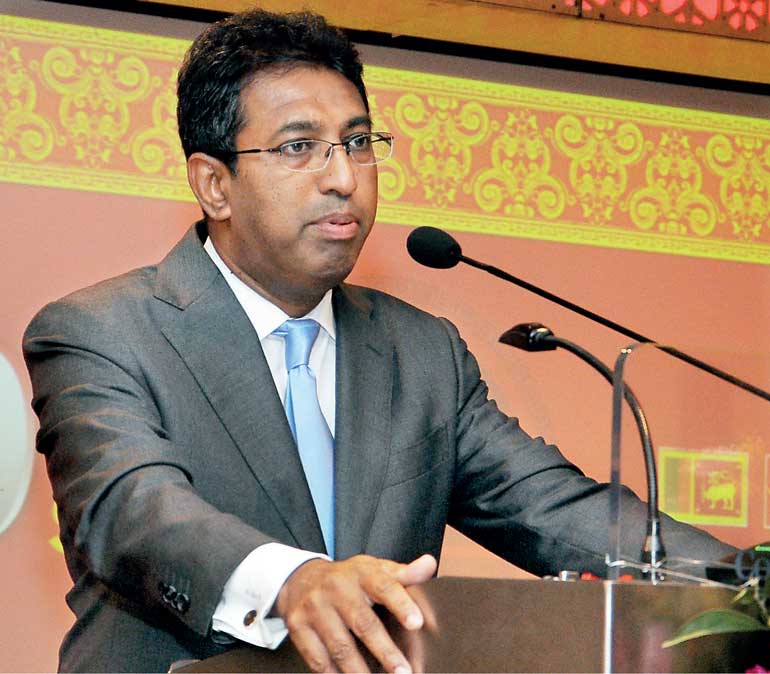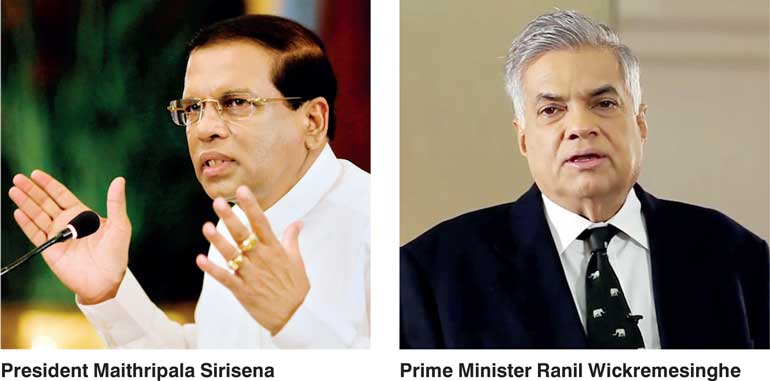Wednesday Feb 25, 2026
Wednesday Feb 25, 2026
Monday, 11 September 2017 00:00 - - {{hitsCtrl.values.hits}}

National Policies and Economic Affairs Deputy Minister Dr. Harsha De Silva
A lamenting Deputy Minister
Deputy Minister of Policy Planning and Economic Development Dr. Harsha de Silva in an emotion-filled intervention during a live television discussion program berated the whole administrative system of the country (available at: https://www.youtube.com/watch?v=H7XgAbIfq1o).
His charge was that from top to bottom and from one side to the other, known to strategic planners as viewing  things from a 360 dimension, things have been marred with stinking corruption, waste and theft of public funds.
things from a 360 dimension, things have been marred with stinking corruption, waste and theft of public funds.
Hurling corruption charges at each other
He has confessed that he had been disgusted with the nauseating politics and the corrupt system that has nurtured it. Instead of using time, energy and resources for planning and implementing policies for the development of the country, everyone is engaged in hurling corruption charges at each other.
One politician is charging another that the latter is corrupt; the latter retorts immediately charging that it is the former who is corrupt. Thus, everyone tries to play the role of the good policeman believing that all others are at fault. Harsha says that his intention in entering politics has not been to function as a policeman.
Corruption is everywhere
Instead he has joined the political force to use his technical capability as an economist for the betterment of people. Yet, what he observes is widespread corruption everywhere, for example, from municipal councils to hospitals to private eating houses.
One cannot have a building plan approved, charges Harsha, unless he is ready to pay a bribe to local authority officials. Even at hospitals, if one wants to get preferential treatment, one has to pay a bribe. His position is that this epidemic should be eradicated if Sri Lanka is to develop as a decent nation.
Fighting against corruption
Harsha has observed both the small and big picture of corruption profile of Sri Lanka. In his charge against corruption, he has been both angry and emotional. Angry because he has been such a small keg in the power machinery of the country that he cannot direct bigger forces for building a clean society according to his ideals. He had been a vociferous critic, both in Parliament and outside, of the previous administration’s alleged corrupt deals and practices (available at: https://www.youtube.com/watch?v=3kWIlDAiIjw).
Failure to investigate corruption charges
Now, even after two years in power these charges have not been conclusively investigated, specifically the losses incurred by the Central Bank on account of the alleged hedging deal and investment in Greece bonds. He had also charged the Central Bank on account of misusing funds belonging to the members of the Employees Provident Fund or EPF by the previous administration. Yet, nothing had happened about making formal inquiries into those allegations.
Expressing dissatisfaction at a public forum
His dissatisfaction was openly expressed when he questioned in a public forum the Governor of the Central Bank, Arjuna Mahendtran, an appointee to that post by his Government, about the wasteful investment of EPF funds in the stock market (available at: https://www.youtube.com/watch?v=U8DfVl2-3n0).
After Governor Mahendran gave an irrelevant answer, he went on grilling him about the wisdom of EPF-owning private banks.
Controlling private banks through EPF
This was a criticism levelled against the previous administration and when the new government came to power, it was expected to be rectified. But Governor Mahendran, who appeared to be ignorant of the previous criticisms levelled by Harsha, justified the investments in question on the grounds that it would increase the return to members, albeit the published data had suggested the opposite.
This writer too in two previous articles called the Government to divest the shares owned by EPF in private banks due to the potential conflict which it brings to the Monetary Board of the Central Bank.
Continuing to follow the previous administration
Yet the Government continued to use the extraordinary privilege which it had inherited from the previous administration to control private banks by appointing its own members as board members. Thus, instead of ushering an era of good governance, it continued to practice the same malgovernance principles unabated.
Corruption charges against the present Government
The present Government was brought to power by people to eliminate corruption and create a law-abiding clean society. But its track record during the last two and a half years has been marred with similar corruption charges. Now Harsha, sitting on the other side of the debate, has been required to answer those charges in public. Naturally, he should be angry about the embarrassing position to which he has now been driven.
An ambulance service coming under attack
Harsha has been emotional not only when he has been too angry at injustice. He has been emotional when the fruits of his labour had produced the required results too. One such occasion has been the inauguration of the Indian Government sponsored ambulance service in Sri Lanka. That service was the target of criticism by the Government Medical Officers Association or GMOA which had issues with India on account of the proposed Economic and Technology Cooperation Agreement, popularly known as ETCA, with that country.
Hence, objecting to everything Indian, the GMOA began a campaign against the service that it would pave the way for unqualified Indian paramedics to play with the lives of vulnerable and voiceless Sri Lankan patients. It even raised a national security issue for Sri Lanka implying that those ambulances, manned by Indians, could have access even to the President’s residence. Thus, when the first batch of Sri Lankan paramedics was trained and recruited to the service, Harsha became too emotional to deliver his speech (available at: https://www.youtube.com/watch?v=6SZCZaiK_FM).
The exemplary track record of the ambulance service
The track record of the ambulance service since its inauguration has shown that it has indeed been a lifesaver for Sri Lankans, contrary to the demonic picture painted by GMOA. This writer can vouch for its excellent service with firsthand experience. The occasion arose when his elder sister suffered a massive stroke in the evening of a public holiday when no one was around at home.
With no other alternative available, Harsha’s ambulance service was contacted for help. Within five minutes of calling, an ambulance showed up at the residence staffed by paramedics and equipped with most modern first aid apparatuses. The paramedics, who were all Sri Lankans, provided all the first aid necessary whilst in transit including the supply of life saving oxygen to the patient. They were constantly in contact with the hospital about the patient being transported and, therefore, the hospital staff was in readiness to receive her. The driver who was also a Sri Lankan navigated the vehicle expertly to reach the hospital within minutes.
Her life was saved because she could get the required medical attention in time. The central office of the ambulance service had later contacted the niece of this writer to ascertain whether she was satisfied or not with the service provided. Such customer satisfaction and suggestion seeking follow-ups with citizens are totally alien to the other public services in the country.
Institutionalisation of corruption in Sri Lanka
The problem with Sri Lanka is that corruption has been institutionalised as a normal activity. It is a part of the value system of Sri Lankans. The public sector that includes politicians believes that it is their right to get illegal rewards from the public and pocket out them without disclosing to anyone.
The private sector believes that it is their obligation to award various forms of gratifications to those in power. Thus, touts flock around politicians when they come to power and function as middlemen soliciting unearned rewards from people when they want to get even legitimate services from the Government.
If people do not oblige, papers would be unnecessarily delayed or even files would disappear without a trace. Papers would reappear only after the rates of unearned rewards are agreed upon and delivered.
Shadowy bodies around real administration bodies
Many have experienced that at every public sector regulatory body, there is a ‘shadowy body’ too and they have to first go through that shadowy body before their applications can be considered by the real regulatory body. Since time and inconvenience are costly, people choose the easy path of agreeing with the rate of reward to be awarded to the people behind the shadowy body.
At the lowest level, even getting a rates file transferred at a local body requires a citizen to face the reality of the shadowy local body if he is to have his request processed by the real local body. The normal modus operandi is that the citizen would be informed that the file is incomplete and therefore cannot be processed. If it goes on for some time without awarding the requested reward, the file would simply disappear to miraculously reappear once the reward is properly paid out.
At the highest level, many foreign investors have confided with this writer that their applications for approval of foreign investments had to be first tackled at the shadowy approving body before they were to be processed by the real approving body. This system is deeply rooted within Sri Lanka’s culture today. When it could no longer be tolerated, the citizenry changed the Government in January 2015 to put a stop to it.
Increase in corruption perception after the new Government came to power
However, after the new Government came to power, instead of reducing the corruption levels, the overall corruption perception in Sri Lanka has increased over the last two years, according to the Corruption Perception Index being compiled by Berlin-based Transparency International annually.
In the corruption perception, if a country is extremely corrupt, its score is zero out of 100; if it is very clean, it can expect to have a perfect score of 100. In Sri Lanka’s case, at the end of 2014, the country had scored 38 out of 100; that score had placed it at the 85th position out of 174 countries (available at: https://www.transparency.org/cpi2014/results).
After two years of the new Good Governance Government, Sri Lanka’s score has fallen to 36 out of 100 lowering it the 95th position out of 176 countries (available at: https://www.transparency.org/news/feature/corruption_perceptions_index_2016).
This deterioration has taken place despite the fact that only 20% in Sri Lanka believing that corruption has increased and 49% thinking that the government is fighting hard to eliminate corruption, according to a report published by Transparency International in March 2017 (available at: http://files.transparency.org/content/download/2118/13484/file/2017_GCB_AsiaPacific_EN.pdf).
According to this report, people have perceived that the Police has been the most corrupt institution followed by public bodies that issue permits, public schools, water and power authorities, and the courts system. Government hospitals have maintained less corrupt systems, as revealed in this report.
Don’t be complacent about small gains of corruption perception
Sri Lanka is still better than some of the countries in the region like Pakistan or India. In India, the percentage of people who have paid a bribe to receive public services has been about 69% and in Pakistan, it is about 40%. Comparably, Sri Lanka’s percentage has been low at 15%. This is not a reason for the Government to be complacent.
Government says it is committed to fighting against corruption
Corruption is still stinking and unless the Government takes action to nip it in the bud, it infects the whole society like an epidemic. Sri Lanka is gradually moving to this level and it is not a good sign for a country which aspires to become a rich country by 2025, according to the vision of the present Government. Richness does not come through only an increase in income or material well being. It comes through a culture in which people recognise that seeking unearned incomes from fellow citizens is immoral and unethical.
When the corruption levels are low, it gives incentives for people to work harder and enjoy the fruits of their labour. That is the system that is conducive for a country to attain a sustainable economic growth. Thus, Harsha’s lamentation should be followed by concrete action to eradicate corruption. The Government’s V2025 document has pledged that it is ‘committed to fight against corruption’ since it negatively impacts the country’s global outlook. This is a fair enough promise, but these words have to be converted to deeds if real results are to be attained on the ground.
(W.A. Wijewardena, a former Deputy Governor of the Central Bank of Sri Lanka, can be reached at [email protected]).